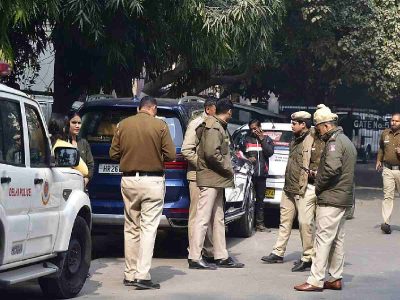Jayanto Mitra, 20, a student at a prominent Delhi college, ran from pillar to post trying to find out why the college cancelled his exams, citing poor attendance, only after he had already taken them.
With no transparency about how attendance is recorded at the college, Mitra was unable to get a clear explanation from the authorities.
“I kept trying to talk to the principal of our college, as well as the head of department, but none of them wanted to hear the end of it,” said Mitra, a Social Sciences student pursuing a Bachelor’s degree.
Mitra sent multiple emails to the dean, all of which went unanswered, except for one.
“He finally replied, stating that he would not give me a time to meet.”
“I had to file a Right to Information (RTI) request to learn about our attendance structure. The entire system is randomised, as the attendance requirement varies by department,” said Mitra.
“For instance, we initially had a 75 per cent attendance requirement, which was later changed to 50 per cent. We were not informed of either requirement, and the change occurred midway through the semester,” he added.
Mitra, an aspiring musician, tries to find time outside his college hours to pursue his creative pursuits. However, he stresses that has always taken his education seriously, striving to balance both.
Surprisingly, Mitra received no prior warning that he was falling short of the required attendance, which would later become a problem.
“I had even submitted all of my assignments and projects on time as well.”
Despite sitting for his exams and being graded, Mitra’s performance was ultimately deemed null and void.
“My parents were dragged into the issue too. They pleaded with the college authorities to make the process more transparent, as it wasn’t just me—there were many students facing the same problems,” Mitra said.
Also read: Delhi sees a rise in rape cases again; police blame migrants
When empathy fades
A similar situation forced Kajal Sharma, an English Honours student at a prestigious college in the capital, into a depressive episode.
Her father had fallen ill with a cardiovascular ailment and required several trips to the hospital’s Intensive Care Unit.
Hundreds of kilometres away from her home in Haridwar, Sharma was understandably anxious.
When she learnt that her father was to undergo surgery, she decided to go home.
“I booked my flight ticket as soon as possible,” she said. “The next day, I submitted a letter requesting permission, but I didn’t receive any reply or acknowledgement. I went ahead with my plans and headed home.”
A few days later, she returned, confident she could catch up on missed classes, knowing she still had time to meet the 66.66 per cent attendance requirement.
However, upon her return, she was informed that she had fallen short of the attendance requirement by just two percentage points.
“I was shocked when I found out,” Sharma said. “I gathered all the necessary documents, including my father’s medical reports, but the administration refused to make any exceptions.”
“I had to drop a year since no one was willing to listen to me. At least my father survived the operation.”
A pan-India problem
However, these issues are not confined to the national capital; similar instances can be observed across the country.
From Delhi to Kolkata, Chennai to Mumbai, students everywhere have faced severe harassment due to attendance policies.
“We had an assignment where we had to visit a rural area and develop stories about the place,” she said.
During the assignment, the aspiring journalist’s grandfather fell ill and went into a coma. She had only finished a part of her documentary when her grandfather passed on, and she found herself unable to finish it.
When she requested an extension to attend the funeral, her professors instructed her to return to college, submit the documentary, and then go back home for the funeral.
“We had to edit the documentary at the college. I offered to complete the editing from home, but they refused to accommodate that. One professor even remarked that everyone experiences family deaths, and he had never found the time to mourn his own grandmother when she passed away,” she said.
“They did not allow me to grieve properly,” she added. “I had to comply because failing to submit the assignment would result in failing the course.”
A baffling twist of logic
Joshua Gonsalves, a student at a renowned engineering college in Mumbai’s Bandra, found himself on the defaulters list through no fault of his own.
“The defaulters list includes students who have consistently missed classes throughout the semester,” explained Gonsalves.
The college has barred him from sitting for both his mid-semester and end-semester examinations.
“I have attended all my classes with the utmost sincerity. They are not allowing me to sit for the exam because I missed two classes, and that was only in one course,” he said.
The professor had scheduled a total of 15 classes but only conducted five. Gonsalves missed two of these, which caused him to fall short of the required attendance percentage.
“Furthermore, I wasn’t given the opportunity to present my case since the defaulters list was released on a Friday, and exams started the following Monday,” Gonsalves said.
He sent a letter to the administration and sought a meeting with the dean, but nothing came of it.
“I have an overall attendance of 91 per cent. I’m not the best student, but I am punctual. Now, I have to pay a Rs 5,000 fine to sit for these tests next semester due to circumstances beyond my control. It feels like harassment,” he said.
Also read: Delhi riots: 2790 victims still await compensation
Death of a student
Earlier, on August 27, during a hearing in Sushant Rohilla’s case—a student of Amity Law School who died by suicide after allegedly being barred from exams due to low attendance—the Delhi High Court stressed the need to reconsider mandatory attendance rules for college students, especially in light of the COVID-19 pandemic.
The court observed that students today perceive attendance differently and noted that mandatory attendance requirements can negatively affect students’ mental well-being.
Additionally, the court highlighted that, particularly since the COVID-19 pandemic, online learning has become more common for students.
The court had also directed the Ministry of Education to initiate a stakeholder consultation to determine whether attendance norms should remain compulsory for undergraduate and postgraduate courses.
On September 9, the Delhi High Court instructed Amity Law School to pay an ex gratia amount to address some concerns raised in a petition filed by Rohilla’s family.
“Institutions should adopt a broader perspective. No one is blaming an individual for this. There has been a systemic failure, for whatever reasons. If there is a systemic failure within the institution, it must take responsibility. The institution’s shoulders must be broad enough to shoulder this responsibility,” remarked the bench led by Justices Pratibha Singh and Amit Sharma.
The court pointed out that the university should have addressed these issues earlier and should have provided an ex-gratia payment following Rohilla’s death.
Rohilla, a third-year student at Amity Law School in Noida, took his own life on August 10, 2016, reportedly after his college barred him from appearing for exams due to low attendance.
He had left behind a note saying that he was a failure and did not deserve to live.





